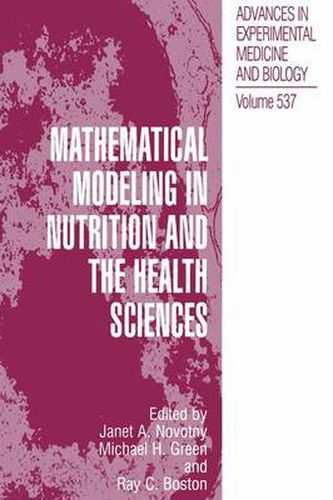Readings Newsletter
Become a Readings Member to make your shopping experience even easier.
Sign in or sign up for free!
You’re not far away from qualifying for FREE standard shipping within Australia
You’ve qualified for FREE standard shipping within Australia
The cart is loading…






This title is printed to order. This book may have been self-published. If so, we cannot guarantee the quality of the content. In the main most books will have gone through the editing process however some may not. We therefore suggest that you be aware of this before ordering this book. If in doubt check either the author or publisher’s details as we are unable to accept any returns unless they are faulty. Please contact us if you have any questions.
Overtheyears,research inthelifescienceshasbenefitedgreatlyfromthequantita- tive toolsofmathematics and modeling. Many aspectsofcomplex biological systems can be more deeply understood when mathematical techniques are incorporated into a scientific investigation. Modelingcanbefruitfully applied in many typesofbiological research, from studies on the molecular, cellular, and organ level, to experiments in wholeanimalsandinpopulations. Using the field of nutrition as an example, one can find many cases of recent advances in knowledge and understanding that were facilitated by the application of mathematical modelingtokineticdata. Theavailabilityofbiologicallyimportantstable isotope-labeled compounds, developments in sensitive mass spectrometry and other analytical techniques, and advances in the powerful modeling software applied to data haveeachcontributed toourability tocarryoutevermoresophisticated kinetic studies that are relevant to nutrition and the health sciences at many levels oforganization. Furthermore, weanticipatethatmodeling isonthebrinkofanothermajoradvance: the application of kinetic modeling to clinical practice. With advances in the abilityof modelstoaccesslargedatabases(e. g. ,apopulationofindividualpatientrecords)andthe developmentofuserinterfaces thatare friendly enough tobeused byclinicians who arenotmodelers, wepredictthathealthapplicationsmodeling willbeanimportantnew 51 directionformodelinginthe21 century. This book contains manuscripts that are based on presentations at the seventh conference in a series focused on advancing nutrition and health research by fostering exchange among scientists from such disciplines as nutrition, biology, mathematics, statistics,kinetics,andcomputing. Thethemesofthesixpreviousconferencesincluded general nutritionmodeling(CanoltyandCain, 1985;Hoover-PlowandChandra, 1988), amino acids and carbohydrates (Aburnrad, 1991), minerals (Siva Subramanian and Wastney, 1995),vitamins,proteins,andmodelingtheory(CoburnandTownsend, 1996), and physiological compartmental modeling (Clifford and Muller, 1998). The seventh conference in the series was held at The Pennsylvania State University from July 29 throughAugust1,2000. Themeetingbeganwithaninstructiveandentertainingkeynote address by Professor Britton Chance, Eldridge Reeves Johnson University Professor Emeritus of Biophysics, Physical Chemistry, and Radiologic Physics, University of Pennsylvania. Dr.
$9.00 standard shipping within Australia
FREE standard shipping within Australia for orders over $100.00
Express & International shipping calculated at checkout
This title is printed to order. This book may have been self-published. If so, we cannot guarantee the quality of the content. In the main most books will have gone through the editing process however some may not. We therefore suggest that you be aware of this before ordering this book. If in doubt check either the author or publisher’s details as we are unable to accept any returns unless they are faulty. Please contact us if you have any questions.
Overtheyears,research inthelifescienceshasbenefitedgreatlyfromthequantita- tive toolsofmathematics and modeling. Many aspectsofcomplex biological systems can be more deeply understood when mathematical techniques are incorporated into a scientific investigation. Modelingcanbefruitfully applied in many typesofbiological research, from studies on the molecular, cellular, and organ level, to experiments in wholeanimalsandinpopulations. Using the field of nutrition as an example, one can find many cases of recent advances in knowledge and understanding that were facilitated by the application of mathematical modelingtokineticdata. Theavailabilityofbiologicallyimportantstable isotope-labeled compounds, developments in sensitive mass spectrometry and other analytical techniques, and advances in the powerful modeling software applied to data haveeachcontributed toourability tocarryoutevermoresophisticated kinetic studies that are relevant to nutrition and the health sciences at many levels oforganization. Furthermore, weanticipatethatmodeling isonthebrinkofanothermajoradvance: the application of kinetic modeling to clinical practice. With advances in the abilityof modelstoaccesslargedatabases(e. g. ,apopulationofindividualpatientrecords)andthe developmentofuserinterfaces thatare friendly enough tobeused byclinicians who arenotmodelers, wepredictthathealthapplicationsmodeling willbeanimportantnew 51 directionformodelinginthe21 century. This book contains manuscripts that are based on presentations at the seventh conference in a series focused on advancing nutrition and health research by fostering exchange among scientists from such disciplines as nutrition, biology, mathematics, statistics,kinetics,andcomputing. Thethemesofthesixpreviousconferencesincluded general nutritionmodeling(CanoltyandCain, 1985;Hoover-PlowandChandra, 1988), amino acids and carbohydrates (Aburnrad, 1991), minerals (Siva Subramanian and Wastney, 1995),vitamins,proteins,andmodelingtheory(CoburnandTownsend, 1996), and physiological compartmental modeling (Clifford and Muller, 1998). The seventh conference in the series was held at The Pennsylvania State University from July 29 throughAugust1,2000. Themeetingbeganwithaninstructiveandentertainingkeynote address by Professor Britton Chance, Eldridge Reeves Johnson University Professor Emeritus of Biophysics, Physical Chemistry, and Radiologic Physics, University of Pennsylvania. Dr.